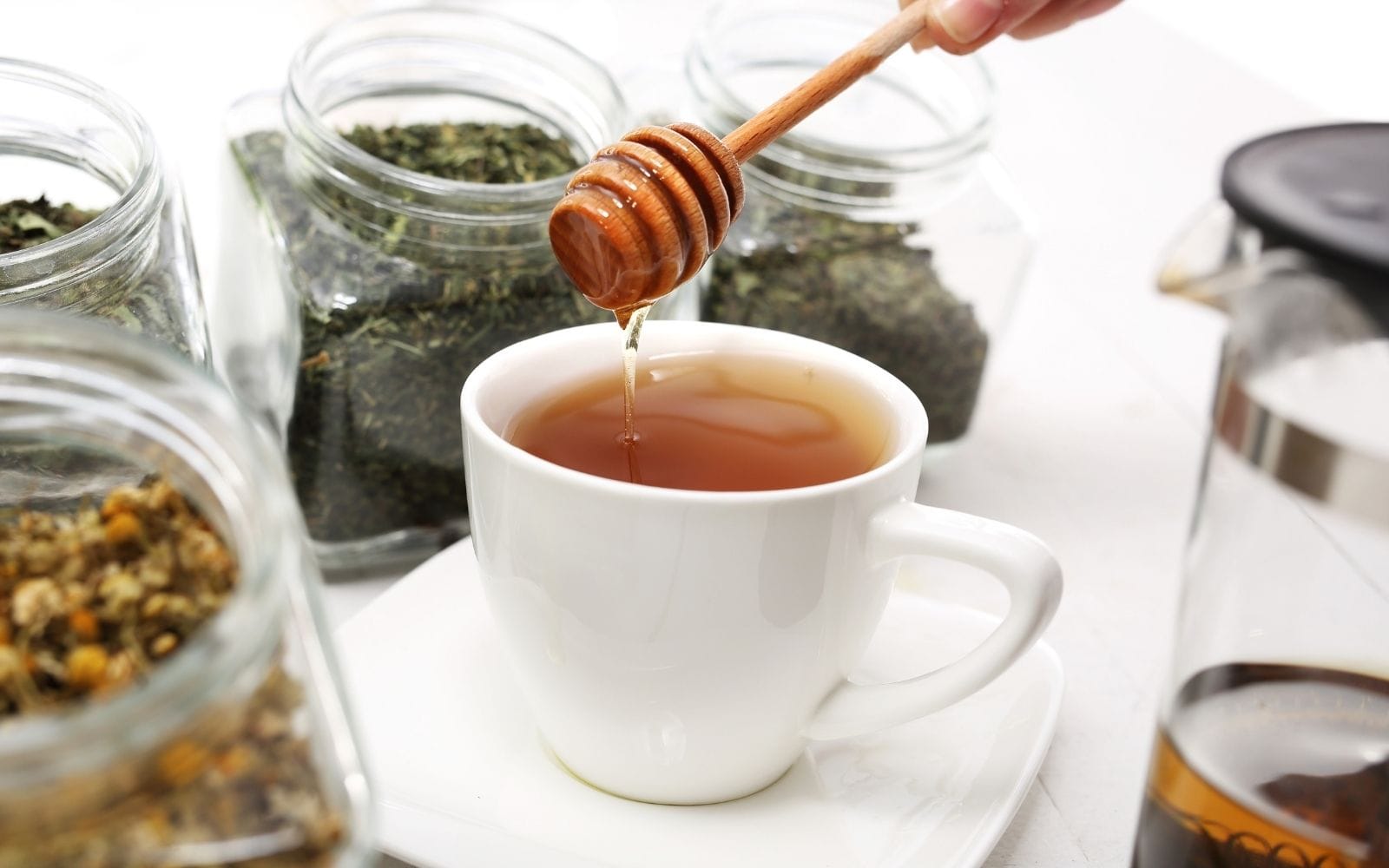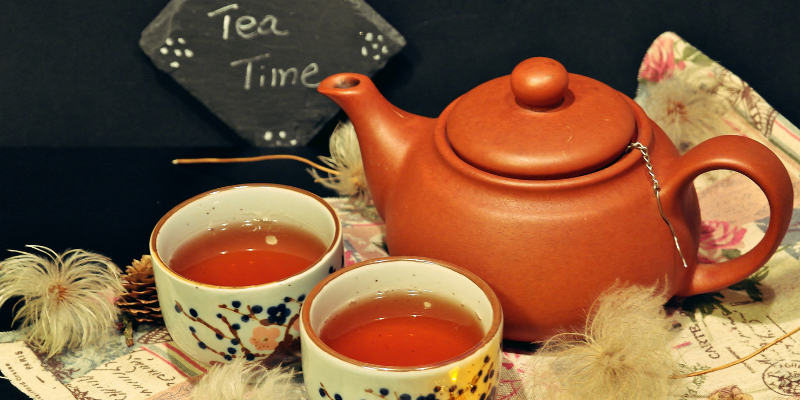11 Super Tasty Alternative Ways To Sweeten Tea Without Sugar

Disclosure: This post may contain affiliate links. If you click on a link we may make a small commission at no extra cost to you. You can read the full disclosure here
How To Sweeten Tea Without Sugar
Are you guilty of adding refined sugar to every cup of tea you drink, even though you realize you’re probably consuming way too much? The sugars we add to our food and drinks are in all likelihood the ones we should try to do without. However, it’s hard to deny ourselves a little sweetness in our life.
So what are the alternative ways we can sweeten tea without sugar that either offer us additional health benefits or helps us to reduce our overall sugar intake for a more balanced diet?
Can you sweeten tea without sugar?
For a sweeter cup of tea, many people simply add refined sugar either out of habit or for ease. However, there are many ways you can actually sweeten tea without sugar; many of them with additional health benefits. If you are looking for a sugar substitute that will sweeten your tea, there are a number of healthier alternatives to explore.
11 Ways To Sweeten Tea Without Sugar

Before we look at different ways to sweeten tea without sugar it’s worth noting that some teas are naturally sweeter than others so you won’t need to add sugar if you like them. There are many herbal teas that can offer you the sweetness you desire for the perfect guilt-free cuppa if you just give them a chance.
My personal favorite is Pukka Peppermint & Licorice Organic Tea, it describes itself as a sweet & deliciously refreshing thrill, and I have to agree. The sweet after-taste is an absolute joy to experience and with zero calories it’s got to be worth a try.

☝️Pukka’s Peppermint & Licorice Tea is a sweet and deliciously refreshing organic thrill☝️
So if you have a sweet tooth to satisfy then let’s look at some sugar alternatives that might just be your cup of tea!
1. Cinnamon
This aromatic ingredient has been used throughout history and is one of the world’s favorite spices. It is made from the bark of a tree found in Asia. It doesn’t dissolve in water so you can either use it whole or break it apart to infuse more flavor into your tea. Alternatively, you could try using cinnamon powder although it is usually steeped whole to make a more medicinal brew.
This warming spice with its distinctive aroma is also thought to be rich in antioxidants thereby offering the consumer many additional health benefits including reduced inflammation and relief from painful menstrual cramps. Its naturally sweet flavor blends well with black teas and can be a great addition to other drinks as well. Just but be sure to remove any cinnamon before serving this tasty sweet tea.
2. Raw Honey
Raw local honey is a healthier option than sugar as it has plenty of other health benefits to offer including antibacterial, anti-inflammatory, and antioxidant properties. It is an appreciated and valued natural product that has been widely used for its therapeutic effects, while sugar is processed with no nutritional value. Honey is a natural sweetener for tea and you don’t need to use as much of it as you would with sugar.
The use of honey in beverages is increasingly popular and evidence indicates that honey can exert several health-beneficial effects. So if you like your tea with a little added sweetness then honey can make an ideal substitute for sugar if used in moderation. It’s important to note that adding honey directly to boiling water may reduce its properties so to gain the maximum health benefits allow your tea to steep a while before adding the honey.
3.Vanilla Pods
Vanilla has a sweet, exotic fragrance and taste. It is widely used to flavor food and beverages as it blends well with so many things. Vanilla pods are a little expensive but as it is quite strong and adds such depth you won’t need much to elevate the flavor of a pot of tea.
This spice is full of antioxidants which may help to reduce inflammation and strengthen the immune system. So if you like a sweet aftertaste that has fewer calories and carbohydrates than sugar, try steeping vanilla pods in your tea to add a wonderful creamy marshmallow flavor.
4. Licorice Root
One of the oldest sweetening products, licorice root has a long history of use, going back to ancient Egyptian, Chinese and Indian cultures. It has a very characteristic sweet aftertaste with notes of anise and peppermint. You can use the whole root, the dried powder, or the extract to naturally sweeten foods and beverages. Many combinations of herbal tea are flavored and sweetened with licorice.
It is believed to have antioxidant, antimicrobial, and anti-inflammatory properties and licorice tea is supposed to be a great herbal infusion for relieving a sore throat. However, when it comes to drinking tea containing pure licorice, moderation is advised. Long-term use or excessive consumption can lead to serious side effects.
5. Fruits
If you prefer your tea ice-cold, try adding strawberries. Not only do they give your drink a visual lift, but they also add that touch of sweetness you’re after for the perfect summer refresher.
You can try other berries or fruit combinations with different true and herbal teas for a variety of taste sensations that may well excite your palette in unexpected ways. Alternatively, you could try adding dried fruits to enrich your favorite brew. With such a wide selection of teas and dried fruits available the possibilities are endless.
6. Maple Syrup
This is another popular natural sweetener that is rich in antioxidants and may therefore provide anti-inflammatory properties when added to your tea. It is made from the sap of maple trees native to Canada creating a syrup that is rich and smooth. The darker the syrup, the more its sugar has been concentrated. Be sure to buy real maple syrup, not just flavored maple syrup which can be loaded with refined sugar.
Pure maple syrup undergoes less processing than refined sugars and has a lower glycemic index. However, even natural sweeteners like maple syrup should be used in moderation, but at least it contains some slight nutritional value, so while it is still a sugar, it can be a better option from a health perspective.
7. Blackstrap Molasses
A thick aromatic syrup with malty notes that adds just the right amount of sweetness to your tea. It is a by-product of the sugar production process that has the added benefits of antioxidants which may provide you with some nutritional value.
Blackstrap molasses also boasts the lowest sugar content of any sugar cane product. Best used in moderation, its rich complex flavor can add a hint of sweetness to your brew together with several important vitamins and minerals.
8. Agave Nectar
A taste somewhere between honey and molasses, this natural sweetener has a low glycemic index which means it doesn’t spike blood sugar levels much. It is much sweeter than sugar so you can use much less of it for the same effects. However, it is worth noting that there are much healthier choices of natural sweeteners available as it has a high content of fructose.
9. Stevia
A plant-based sweetener with zero calories that can be used as a sugar substitute. It is several hundred times sweeter than sugar yet doesn’t raise the blood glucose levels, making it diabetic friendly. It has a mild licorice-like flavor with a slightly bitter aftertaste that may not be acceptable to all. However, it can be quite useful as part of a well-balanced diet to help with weight control.
10.Sucralose
Another no-calorie sweetener that is hundreds of times sweeter than sugar. This artificial sweetener is commonly used as a sugar substitute with no bitter aftertaste making it a popular choice. It is considered safe by health authorities but its long-term effects have been called into question by some recent studies.
11. Honeysuckle Flowers
A lovely sweet flower that offers the tea drinker a pleasing aftertaste. Containing actual nectar, this floral delight has long been used as a natural remedy for various ailments, including the possible reduction of inflammation. Honeysuckle tea makes a delicious and unique summer beverage.
Conclusion
Traditional tea crafters usually believe that the best way to enjoy the full flavor of any tea should be without the addition of any sugar or milk but with that said, many of our modern palates are trained to expect a little sweetness in our brew.
The health benefits of tea are well established which can be a good enough reason to drink it on a regular basis. However, if we are adding refined sugar to every cup, in order to avoid carb overload and all its negative health implications, it may be pertinent to consider an alternative sweetener.
If you can train yourself to do without any added sweetness then hats off to you! However we’ve established here, it is possible to drink tea that’s sweetened without sugar. You can even limit the additional calories that may be involved in your choice of sweetener and enjoy some extra health benefits along the way.
Tea is a great drink that allows you to experiment with flavors and sweetener combinations so you get to enjoy this simple pleasure in so many different forms.
FAQs
What is the healthiest way to sweeten tea?
It depends on what you are trying to achieve. If it is to cut out sugar and reduce calories then either natural or artificial sweeteners can be the way to go. However, if your aim is to enhance the flavor of your tea whilst increasing health benefits then a popular choice is raw honey.
Is honey better than sugar?
Honey has a lower GI value than sugar so it does not raise blood sugar levels so quickly. Honey has slightly more calories but as it is sweeter than sugar you may well use less of it. Also choosing a raw variety of honey provides you with more antioxidants and nutrients than sugar.
Why was Stevia banned?
Stevia is a natural sweetener and sugar substitute, it was banned in 1991 in the U.S. because of concerns over its safety. However, later studies refuted these claims and the FDA allowed stevia to be imported once again into the U.S. It is now generally regarded as safe when used in acceptable quantities.






